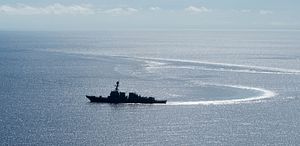In the face of a global pandemic, the governments of Southeast Asian nations are not only struggling to deal with COVID-19 but are also confronted with both persistent and new threats on the maritime front. The dangers to sailors, civilians, and shipping caused by the pandemic are augmented by Southeast Asian states having to deal with nontraditional threats such as the movement of illegal migrants along their porous maritime borders and maintaining sovereignty over their maritime domains. Recently, action by the Royal Malaysian Navy (RMN), Royal Malaysian Air Force (RMAF), and the Malaysian Maritime Enforcement Agency (MMEA) prevented a boatload of more than 250 Rohingya refugees from landing at Langkawi in Malaysia.
On another front, serious stand-offs have increased in the contested South China Sea (SCS) between China and the other claimant states of Malaysia, Vietnam, the Philippines, and Brunei. Assets belonging to China such as survey vessels, coast guard ships, and maritime militia have been spotted in Vietnam’s claimed area. On April 17, the Chinese survey vessel Haiyang Dizhi 8, accompanied by four Chinese Coast Guard (CCG) ships and nine militia vessels moving in formation, made an illegal entry into Malaysia’s maritime area, including the exclusive economic zone (EEZ) and continental shelf. The oil survey vessel and its sizable escort could potentially disrupt the oil and gas exploration activities of West Capella, a drilling ship from the United Kingdom contracted by PETRONAS, Malaysia’s government-owned oil company. Though Malaysia would have anticipated some reaction from China to the drilling operations within the area, the deployment of the CCG and survey ships has not been taken lightly by the Malaysian military as well as civilian law enforcement vessels patrolling the waters.
Another incident involving a CCG vessel and a Vietnamese fishing boat occurred in early April 2020 off the Paracel Islands. Vietnam’s Ministry of Foreign Affairs lodged protests condemning the incident, claiming that the CCG ship rammed and sank a Vietnamese fishing boat.
These new developments have emerged in the South China Sea since early 2020, coinciding with the onset of the COVID-19 outbreak. While it is uncertain whether China is taking advantage of the situation to ramp up its actions in the area, what is clear is that no amount of challenging times can distract the Chinese authorities from their assertions in the SCS. Who would anticipate that a country at the epicenter of the pandemic would step up its vigorous deployments to maintain its maritime interests and ownership claims in such far-fledged domains? After all, China is far enough removed from the SCS that it does not face immediate threats from illegal migrant movements, terrorist activity, piracy, and environmental pollution in the area, unlike the Southeast Asian claimants. The deployment of Chinese law enforcement vessels into foreign EEZs at trying times like these underlines the Chinese government’s uncompromising stand and intimidation of other states despite the ongoing negotiations on a Code of Conduct in the SCS.
In addition, the visit by the USS Theodore Roosevelt to Vietnam raised some speculation that the United States and Vietnam are enhancing military-to-military engagement while Vietnam holds the position of ASEAN chair in 2020. Other factors contributing to the Chinese moves could stem from decreasing engagement between the United States and the Philippines following the latter’s termination of the U.S. Visiting Forces Agreement, which may have emboldened Chinese maritime aspirations in this region.
Another development is China’s launching of a new project called “Blue Sea 2020,” although details are scanty. According to Chinese media, the campaign, launched by the CCG, is primarily for marine environment protection and will last from April 1 to November 30, 2020. However, law enforcement activities under the project will target “violations” of Chinese laws in sectors such as oil exploration and marine coastal construction, as well as sand and sea mining activities. In view of the tensions in the SCS, it can only be surmised that Blue Sea 2020 will also target opposing claimants and be used to conduct unlawful “law enforcement” operations in waters claimed by Southeast Asian states, including Malaysia.
While facing the COVID-19 pandemic, the priorities of most governments are dealing with essential services such as human health security, averting a large-scale economic downturn, keeping global supply chains active, and checking the illegal movements of people across borders, among other threats. At a time like this, it is unfortunate that limited and valuable resources must be diverted to stave off incursions and attempts at asserting authority in maritime domains claimed by various nations. It is disturbing that any nation would take advantage of the pandemic diversion and the vulnerabilities of neighbors to entrench its physical and naval positions in the SCS. Doubtless, such pressures should be dealt with firmly and collectively through existing mechanisms among the countries concerned. Perhaps ASEAN should lead another protest to condemn such intimidation and harassment, particularly since pledges have been made to work toward a successful CoC in the SCS.
Malaysia stands firm on issues concerning the SCS and in establishing the nation’s foreign policy priorities and direction, especially those relating to its sovereignty, independence, and territorial integrity. Malaysia’s military and law enforcement agencies stand vigilant in safeguarding the country’s interests through regular patrols and surveillance by the RMN, RMAF, and MMEA. In the meantime, ASEAN and China should remain committed to the spirit of cooperation and avoid actions that could pose additional risks, particularly at a time when nations should work together to overcome the global distress caused by the COVID-19 pandemic.
Sumathy Permal is a Fellow and Head of Centre for Straits of Malacca, with the Maritime Institute of Malaysia.
































